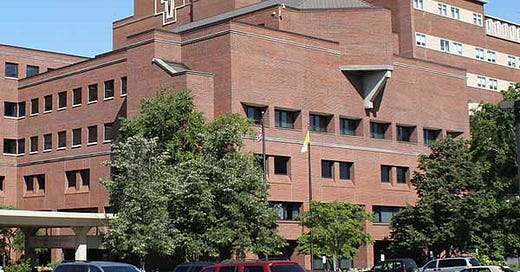This week Kaiser Health News reported on the downsizing of a large hospital in Hammond, Indiana. Hammond is in Chicagoland and has seen significant population decreases over the past few decades. The hospital in question is Franciscan Health Hammond.
This hospital is unique to the area. It was one of the first hospitals in the community and it is large for that area (containing more than 200 beds). On the flip side, however, it is the lowest rated in the county by Medicare and only fifty to sixty of those beds are filled on an average day. Economically, keeping such a large hospital open does not make much sense.
The Franciscan Health system is a large non-profit system in the Midwest, particularly in Chicagoland. They are a Catholic organization and hospitals were founded by a group of Franciscan sisters in 1875. The sisters still have executive control over the hospitals, but most decisions are made by the board of directors (similar to how many religious colleges and universities work).
I bring up their history because it plays a role in the argument of whether to keep the hospital open. When Franciscan Health announced last year they would be downsizing, some community members protested. They said the hospital was necessary for the community, that non-profit (and particularly) Christian organizations shouldn’t focus so much on the economic aspect of keeping it open, and that people would not be able to get care if it closes.
I want to pick apart this argument because, at FLATLINING, we have spent a good deal of time discussing and debating how economics should play a role in our healthcare. After all, if we are going to fix “the most expensive, least effective system in the world” then we can’t be doing the same things repeatedly expecting different results. That’s the definition of insanity.
I’ll start with the emotional aspect of this argument because arguments from emotion are generally the least stable. If it is true that non-profits should not care so much about economics and the financial impacts of their decisions, then non-profits would start and close in an instant. I have no doubt that Franciscan Health takes in lots of money from its hospitals (that is in part how they keep their hospitals open) and I am sure they have a foundation that people donate to that supports them. As a board member of a non-profit organization though, I can assure you there are many discussions about what to do if donations go away.
“Non-profit” is not a business model. Non-profits are effectively businesses that have a community-oriented goal or mission (such as hospitals, education, community radio, etc). Franciscan Health’s mission is to “the best possible care by following the guiding ethical values embodied by our founding congregation, the Sisters of St. Francis of Perpetual Adoration.” There are times when they will evaluate whether their current services are meeting that mission.
Franciscan Health Hammond is the lowest-rated hospital in Lake County, Indiana with only one out of five stars on Medicare.gov. Most of its beds are not filled, and it has only fifteen percent of the market share when combined with another nearby location. Even Kaiser Health News reports that people drive past this hospital to go to other hospitals.
It is obvious that Franciscan Health had a serious discussion about how to best serve its patients and that keeping this location the way it is now is not the best way to do it.
So, what are they doing? Franciscan Health is keeping the Hammond location open but reducing it to an emergency room, outpatient services, and keeping eight beds. The rest of its services are being transferred to the nearby Franciscan Health hospital in Munster. The Munster hospital is higher rated by Medicare and patients on Medicare.gov. It is also a newer facility.
When people like the mayor of Hammond attack Franciscan Health by saying things like, “It’s deplorable that a Catholic institution like the Franciscans would make a financially motivated decision and leave thousands of people potentially at risk,” we should ask, what are they supposed to do?
Should we let them keep this old, poorly rated, unused hospital open to the detriment of other hospitals? There are hospitals within a few miles of this one that patients have been going to already. I should also point out that both the hospital and the town provide transport to low-income people and the elderly to get to doctors’ appointments for free.
As we continue to evaluate how economics plays a role in healthcare, we need to look at some of these tough decisions. Is it inconvenient to go six miles away to another hospital? Yes, it is. But is the trade-off for better and more efficient care worth it? I think it is. Sometimes we get too emotionally attached to things in our community and I applaud Franciscan Health for at least taking the time to evaluate the necessity of this location and even more so for actually making a bold decision.





